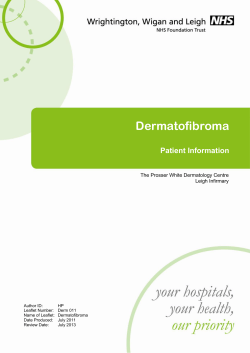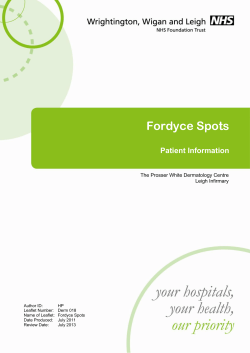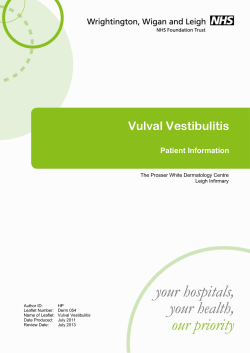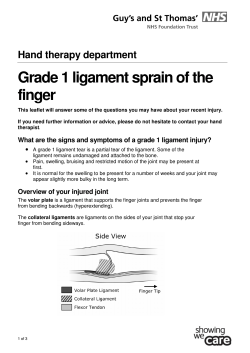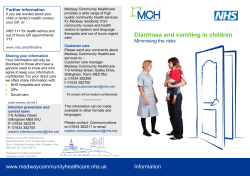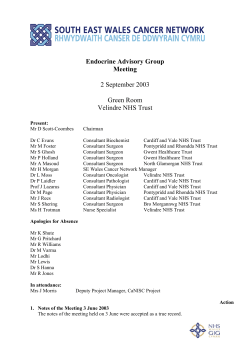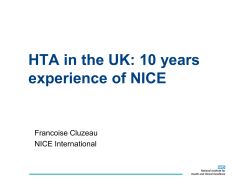
How to access an AAC assessment and equipment: – 2014
How to access an AAC assessment and equipment: Commissioning AAC services 2013 – 2014 For some time now, the AAC community has been asking for an effective and equitable ‘Hub and Spoke’ model of AAC provision to be commissioned across England. Commissioning refers to the process of ensuring that services are identified and provided and that they meet the needs of the population. Since the ‘Liberating the NHS’ changes that came into being in April 2013, most local health services in England will be provided by Clinical Commissioning Groups (CCGs); however, there are a few specialised services, including specialised AAC that will also be commissioned directly by NHS England – the new organisation appointed by the Government to oversee the commissioning of all health services. Specialised services are defined as being low incidence and high cost and in October 2012 it was agreed by NHS England that communication aids/specialised AAC services should be included in the list of 143 specialised services that they will commission directly. Specialised AAC services will provide assessments, communication aids, initial training and support for children and adults with complex communication needs, estimated to be 10% of the population of people who need AAC. The remaining 90% of children and adults who need AAC will be supported by local AAC services, which will be commissioned by Clinical Commissioning Groups (CCGs), education and social care commissioners and overseen by Health and Wellbeing Boards that have been established in every Local Authority in England. Specialised AAC services (also known as ‘Hubs’) There are ten specialised commissioning regions in England and there are teams of specialised commissioners (known as Area Teams) within each region with responsibility for commissioning specialised services, including specialised AAC. At this point in time, not all the commissioners with responsibility for commissioning specialised AAC services have been appointed in every region of the country. However, Directors for Specialised Commissioning should be in a position to identify who is responsible and their contact details are: Jenny Scott Sue Cornick Cathy Edwards Steve Washbourne Carole Theobald Paul Thefaut Steve Sylvester Cheshire, Warrington & the Wirral Cumbria, Northumberland, Tyne & Wear South Yorkshire & Bassetlaw jenny.scott3@nhs.net sue.cornick@nescg.nhs.uk cathy.edwards2@nhs.net Birmingham, Solihull & Black Country East Anglia stephen.washbourne@wmsc.nhs.uk carole.theobald@eoescg.nhs.uk Leicestershire and Lincolnshire Bristol, North Somerset, Somerset & South Gloucestershire Surrey & Sussex Stephanie Newman Mark Satchell Wessex Sue Mclellen London paul.thefaut@emscg.nhs.uk steve.sylvester@nhs.net stephanie.newman@secscg.nhs.uk mark.satchell@nhs.net sue.mclellen@nhs.net Specialised AAC services will be commissioned by April 2014 to provide AAC services for individuals who meet some or all of the following criteria: An individual for whom a specialist AAC service is needed would have/be • In need of a complex assessment (but not necessarily complex equipment) • Able to understand the purpose of a communication aid. • Developed beyond cause and effect understanding. • Communication technology needs beyond the competence of the local AAC service In addition they may have / be some or all of the following: • Severe physical disability especially of the upper limbs. • Additional sensory impairment to the communication impairment. • In need of specialist switch access, which may need to be bespoke. • In need of a device that integrates spoken and written communication, as well as environmental control. • Multiple disabilities which in combination impact on the individual’s ability to communicate. • Experience of using low tech AAC which is insufficient to enable them to realise their communicative potential. The service specification for specialised AAC services can be found here: http://www.england.nhs.uk/wp-content/uploads/2013/06/d01-com-dis-equ-alt-aug-comm-aids.pdf This specification may be subject to change / refinement over the next few years as this new model of commissioning evolves. The implementation of this service specification will be overseen by a Clinical Reference Group (CRG) responsible for Complex Disability Equipment, which includes: - Specialised wheelchair services - Artificial eye services - Environmental control services - Prosthetic services - Specialised AAC Services There is an AAC Sub-Group that reports to the CRG and its members include: - Clive Thursfield (ACT) Chair of the AAC Sub-Group and CRG Member Clive.Thursfield@bhamcommunity.nhs.uk - Simon Judge (Barnsley AT Service) simon.judge@nhs.net - Anna Reeves (ACE Centre) areeves@acecentre.org.uk - Gary Derwent (Putney Royal Hospital for Neuro-disability) gderwent@rhn.org.uk - Judith De Ste Croix (Bristol Communication Aids Service) Judith.DeSteCroix@nbt.nhs.uk - Sally Chan (RCSLT) Sally.Chan@nbt.nhs.uk - Cathy Harris (Chair of Communication Matters) caharriscm@gmail.com The role of the specialised AAC services will be to: • • • • To provide equitable national specialist AAC assessment services for children and adults across the country with complex communication needs To maintain specialist loan equipment bank for assessment, trial and long term loan of specialised communication equipment To provide specialist AAC advice and information and training to individuals, families and professionals involved in the delivery of local AAC services To support the establishment, training and development of local AAC services During the interim period of transition to the new commissioning arrangements from April 2014, a small budget has been identified for communication aid equipment provision. However, it has been recognised by NHS England that this is likely to be insufficient and as a consequence a ‘Convergence Fund’ is being applied for within NHS England to meet any additional costs for AAC equipment for individuals meeting the eligibility criteria this year for specialised services’ funding. Access to this funding is conditional upon a professional independent assessment that clearly demonstrates clinical effectiveness and is based on the needs of the individual. In the first instance, it is recommended that this is discussed with the local AAC service, if this exists or one of the following organisations: - - - - - - East Kent Adult Communication and Assistive Technology Service http://www.ekhuft.nhs.uk/patients-and-visitors/services/a-z-ofservices/radiological-sciences/medical-physics/adult-cat-service/ Regional Communication Aid Service, Newcastle http://www.ntw.nhs.uk/sd.php?l=2&d=9&sm=35&id=243 Barnsley Assistive Technology Service, Barnsley General Hospital http://www.barnsleyhospital.nhs.uk/services/assistive-technology/ Compass Assistive Technology Service, Royal Hospital for Neurodisability http://www.rhn.org.uk/our-work/our-services/electronic-assistive-technology/ Chailey Heritage Clinical Services http://www.sussexcommunity.nhs.uk/services/chailey/res.htm North West Assistive Technology http://www.northwestassistivetechnology.nhs.uk/ Access to Communication and Technology (ACT), Birmingham Community Healthcare NHS Trust http://www.bhamcommunity.nhs.uk/about-us/services-directory/specialistservices/rehabilitation/services/act/ Bristol Communication Aid Service http://www.nbt.nhs.uk/our-services/a-z-services/bristol-communication-aidservice ACE Centre www.acecentre.org.uk Communication, Learning and Technology Service, Great Ormond Street Hospital for Children http://www.gosh.nhs.uk/medical-conditions/clinical-specialties/neurodisabilityinformation-for-parents-and-visitors/clinics-and-services/communicationlearning-and-technology-service/ Dame Hannah Rogers School and young adult provision and AAC assessment service, Devon http://www.discoverhannahs.org/LearningAndDevelopment/speechandlangua ge.cfm Assistive Communication Service, Central London Community Healthcare NHS Trust http://www.clch.nhs.uk/services/speech-and-language-therapy-for-adults.aspx Local AAC services (also known as ‘Spokes’) For those individuals who do not meet the criteria for specialised AAC commissioning but who need AAC, provision should be met by local health (CCG), education and social care commissioners. Health and Wellbeing Boards are ultimately responsible for ensuring that local AAC services exist and/or are maintained or established to meet the needs of the local community. Health and Wellbeing Boards have been set up to: - improve local joint commissioning arrangements enable local services to meet local need - ensure that health inequalities are reduced Included on every Health and Wellbeing Board is a Healthwatch representative who is responsible for ensuring the voices of people who use local health and social care services are heard. Ideally, local AAC services should be jointly commissioned for children and adults. However, if no local AAC service is available, contact should be made to the CCG via a GP or other health professional, or alternatively an approach could be made to the local Healthwatch representative. Information about Healthwatch representation can be found here: http://www.healthwatch.co.uk/ in order to raise awareness of this need with the Health and Wellbeing Board. This document has been developed by members of the AAC Sub-Group, CRG Complex Disability Equipment July 2013
© Copyright 2025

